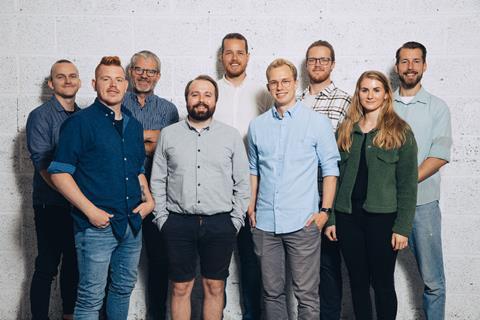Avisomo will build a fully automated vertical farm directly integrated into retailer’s existing distribution centre
Avisomo, an Oslo-based turnkey vertical farming systems developer and equipment manufacturer, has formed a strategic partnership with Norway’s second-largest supermarket chain, Coop Norway, to build a fully automated vertical farm directly integrated into its existing distribution centre.

The vertical farming sector has been hit by rising energy prices, interest rates, and increased cost of capital, and has seen prominent early adopters falter over the last couple of years.
By integrating the farm into Coop Norway’s distribution chains, Avisomo said it shares risks such as energy, food price fluctuations, access to consumers, stability and longevity and reduces the need for middlemen.
Together, Avisomo and Coop are investing €5.2m in the new venture, which will bring fresh, affordable and local salads to Norwegians all year round.
Avisomo said its fully automated and remotely operated indoor growing system – named ‘Frøy’ after the Norse god for wind, rain, and sun – differs from other vertical farming solutions thanks to its flexible and modular approach built on recognised standards from the established food industry.
The farm will eventually produce vegetables and salads at scale and at a competitive cost without any form of human interaction with the plants, eliminating the need for import, and guaranteeing quality, affordability, and reduced climate impact.
Martin Molenaar, CEO of Avisomo, commented: “Our approach is based on growing produce directly in standard-sized trolleys that are well-established in the food industry, and moving the plants around the facility utilising automation robots.
“This ‘plant-to-personnel’ approach both reduces staffing needs and enables us to integrate well-tested automation machinery into the farm, reducing both upfront capital needs and operational costs”.
The joint venture has the potential to transform how Coop secures and distributes all of its leafy greens in the future. The goal is to transform the food system to ensure food and nutrition security for Norway and beyond.
Hege Berg-Knudsen, CEO of Coop Norway Industries said: “We see a huge potential in the collaboration with Avisomo to build Coop’s first vertical farm and start the process of securing our year-round lettuce deliveries. We have been scouting for technology providers that can deliver on our needs for the last five years or so, and Avisomo is the first company to provide such a scalable solution that is also compatible with full automation”.
Vertical farming is poised to become an essential ingredient to future food and nutrition security, but has struggled to obtain a strong foothold in the food supply chain. Rising energy and food prices, high installation costs and overly ambitious business models have led to a large number of failures among the venture capital-funded early adopters in the industry. Avisomo said its philosophy and strategy represent the new generation of virtual farmers, with a strong focus on flexibility, automation and remote managing.
Founded by Martin Molenaar and Jo-André Flåseth in 2018, the company has developed a growing system and business model that it believes will help deliver a sustainable future for the sector. Central to this is the construction of a fully automated and remotely managed farm that produces what the client wants when they want it and capable of producing a wide variety of crops.
Avisomo said it hopes to help Norway to become self-sufficient in vegetables and salads. “For example, Norway currently imports 7,000 tonnes of rocket each year with a total sales value of €160m. Now this will be grown in Norway with all economic, social and environmental benefits this brings,” the company stated.
“Currently about 30 per cent of imported lettuce is thrown out before it even reaches the stores. Vertically farmed produce is simply not wasted and promises a shelf-life up to eight times longer than conventional lettuce.”
And, unlike other approaches to vertical farming, Avisomo has the potential to build skyscrapers containing its systems, significantly reducing the current land area needed for plant production. The company said vertical farming also has the potential to reduce water usage by up to 99 per cent.



